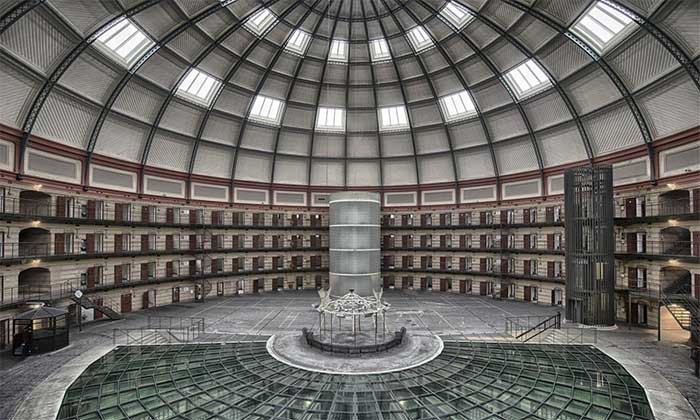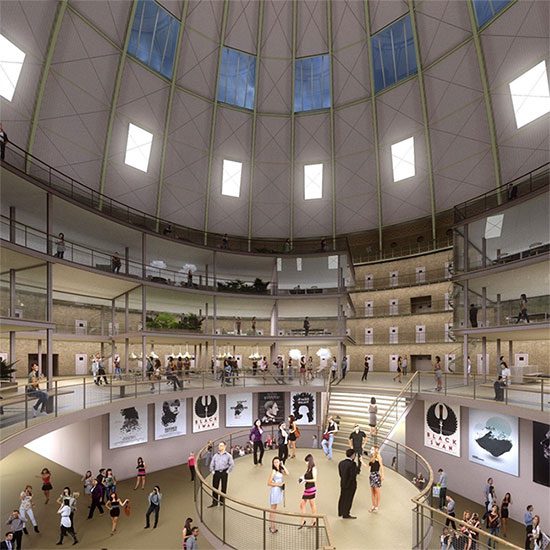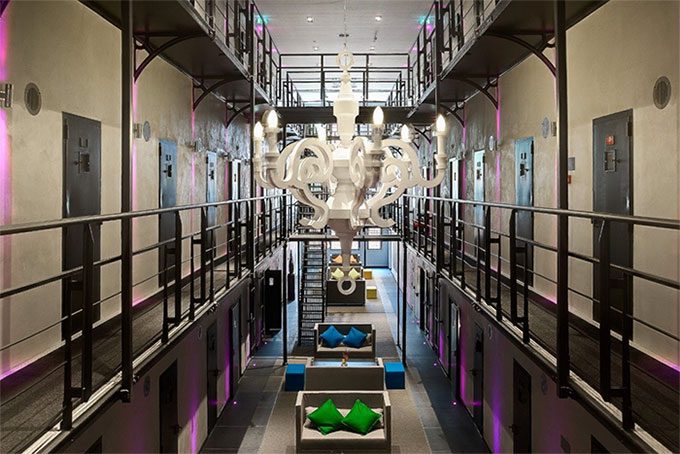Sometimes, due to the fact that citizens do not commit crimes or offenses warranting imprisonment, prisons in this country remain empty. As a result, the nation has to import prisoners to keep the facilities operational.

Prisons are so empty that even with imported prisoners, there is still a surplus, requiring repurposing into useful buildings for society.
With 1,000 students divided among three campuses, a school in Amsterdam, Netherlands, struggled for a while to find additional locations to meet the growing demand for international education. This was until they found a spacious and airy 14,000 m2 property. They moved there in April.
This location offers many advantages, the most notable being its security and safety. Because until recently, this place was still a prison.
The prison’s chapel has been repainted with shiny chestnut beams. The mirrored dome at the center of the building is an ideal spot for observing the four surrounding corridors.
This is one of the prisons in the Netherlands that has been repurposed, often in socially beneficial ways.
Just 20 km away in Haarlem, the old De Koepel prison is being transformed into a multifunctional space, serving as both student housing and social housing, potentially addressing the nationwide shortage of both types.
Wolvenplein in Utrecht has created an urban beach within the steep walls of the gymnasium, while Bijlmerbajes in Amsterdam has become a temporary shelter and job creation site for several refugees. They converted 15 cells into a Syrian hammam.
While the UK embarks on building its largest prison in over a century, with the number of prisoners nearly doubling in the past 30 years, the prison population in the Netherlands is following the opposite trend. Today, the incarceration rate per capita in the Netherlands is half that of the UK, with significantly fewer repeat offenders and a continuous decrease in crime rates.

Prisons have been converted into multifunctional spaces for students to study and live.
Helping Prisoners Reintegration into Society
While the British government imposes more life sentences than any other country in Europe, the Dutch see the benefits of a less punitive approach. On average, there are only about 30 individuals serving life sentences in the Netherlands.
Having once been traumatized by Nazi occupation during World War II, the Netherlands has a “strong awareness of the dangers of an authoritarian state and the horrors of imprisonment,” explains Francis Pakes, a criminology professor at the University of Portsmouth. This means that the Dutch use prison sentences less frequently than before the war, and those incarcerated are typically treated more humanely.
Pakes states: “In the UK, being tough on crime is seen as a solution to the threat of disorder. Whereas in the Netherlands, crime is something the whole system needs to address. There is investment in intervention programs for youth, electronic tagging, and care at home for offenders with addiction and mental health issues. These actions have facilitated rehabilitation and reduced the time that inmates spend in prison.”
Pakes further explains: “In the Netherlands, prisons are generally better maintained, staff have a positive attitude, accommodations are spacious, and many places are quite tidy. Studies have shown that these are all factors that help offenders have a higher likelihood of successfully reintegrating into society.”

In the Netherlands, prisons are generally better maintained, staff have a positive attitude…
Outdated Methods
Low poverty rates, high social welfare, and a relatively non-materialistic culture play significant roles in reducing crime, as the Dutch tend to value modesty over ostentatious displays of wealth and live simply.
Rivelino Rigters, a musician, author, and entrepreneur of a social enterprise based in Amsterdam, notes the downsides of incarceration.
As an orphan who once wanted to fit in with other boys, he became involved in drug dealing and theft, serving his first prison sentence at the age of 13. However, prison only exacerbated his criminal connections.
“I became worse before I even stepped inside.”
Rigters emphasizes: “Locking someone up is not the solution to the problem. Sometimes it just makes a bad person worse because for some, crime is their last resort or when they have no other way to make a living.”
Instead, Rigters’ organization, Criminal Minded – which advises current and former prisoners on accessing the skills and networks they need to rebuild their lives – exemplifies the more personalized approaches currently being tested.
This organization focuses on “strengths, talents, and abilities” of offenders and “what needs healing for them to make positive strides.”
Pakes believes that the prison-based justice model may have become outdated. He states: “When talking to senior police officers, prosecutors, or Dutch judges, very few will speak about the positive impacts of imprisoning someone. No one really believes that it works.”
Repurposed Prisons
As Hotels and Restaurants
In the city of Roermond, the buildings are now home to Hotel Het Arresthuis and the Michelin-starred restaurant Damianz owned by this hotel. This was once a state prison from 1863 to 2007.
This prison housed most drug traffickers and illegal immigrants in its later years. Now, it offers rooms ranging from ‘fully furnished cells’ to luxurious suites.
Shopping Centers and Libraries
The entrance, surrounded by a moat and the towers of Blokhuispoort prison in Leeuwarden, now welcomes visitors to a cultural shopping center. It is designed to encourage investment in a province with the lowest GDP nationwide.
The Alibi hostel provides affordable accommodation. The prison’s chapel has been converted into the central library of the city, completed in 2021.


















































